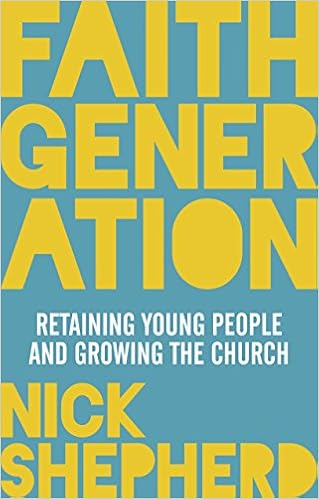
Im going to interupt a few recent blogs on detached youthwork, and reflections from the federation of detached youthwork to reflect on ‘Faith Generation’ . It is the latest of one of only a few British based youth ministry titles published per year.
Let me start this review of Faith Generation by stating something of my position as i read it. I haven’t been involved in the kind of youth ministry described in this book for over 10 years. When i was involved in that kind of youth ministry it was in Scotland, the last time i would truly say i was involved in the kind of youth groups and drop in clubs that had a Christian message was 2002, and in anything resembling a full-time capacity 1997-8. I feel this is important to say, for an additional reason, that since 2004 i have very little engagement with current literature on this type of youth ministry, I read to be inspired about practice and this has included extensively on detached youthwork and youthwork in general as this is a framework and discourse that i believe that shares much with faith based youth workers, common language, views on humanity and educational framework, as well as philosophies. I have had little reason to interact with the literature of English youth ministry in 12 years, neither youthwork magazine or grove booklets (ive read a few) or the few published pieces.
So, Nick Shepherds offering ‘Faith Generation’ (FG) based upon his findings in his Phd made for something of a catch up. Did i find contained in this book something new, something fresh, and a reassurance that youth ministry is starting to construct a different methodology or nuance based upon research, reflection and intra-disciplinary study?
Well, it starts with an interesting premise from the statement in Nicks research stating that; ‘Young people are trying to ‘be’ Christian’ and that they find this difficult in a number of situations. The strengths of Nicks piece is where he develops thinking from critical reflection on the dominant growth and transition narratives of young people, especially those involving Faith development, such as Fowler and Westerhoff, arguing that for everyone, not just young people ‘ finding faith becomes a lifelong project’ (FG, p120).
Though Nick is keen to differentiate between a Faith that young people identify with-where it is generated as opposed to being nurtured , for Nick this is described as developing an ecology of faith, and places where , in effect, young people can be Christian and a faith generation emerge, might that mean that that ecology is some kind of faith generator? I wonder why Nick uses the term Ecology for this place – rather than ‘culture’ given that the differences in practice seem small, not that i dont agree with the essence of what Nick is suggesting, developing a Christian identity in young people is crucial, and is done by creating places where it a faith that is as plausible and reliable and is also useful, useful for everyday life, and put to the test in actions such as Mission or community serving or personal circumstance.
Nick is right when he argues that the semantics of groups – ie is something church, or a youth group or a fresh expression are less important for the young people and their faith identity, than how the church determine them, – each has the task of developing faith identity, doing so in a number of ways. Firstly, enable Christian presence through participation – where ‘young people move from learners to deciders’ – (I suggest this is done as soon as possible using as many mechanisms as appropriate) Yet, the critical question is that young people often decide is when they are going to leave the church, not when do they decide that this faith community is one they want to stay and contribute as a ‘co-learner (FG, 156-7). Nick also argues that faith generation is a requirement and possible where it is needed the most, as well for groups and churches to be involved in mission, a task that Nick urges is to turn neutral spaces into christian ones – whether this is the open youth club, and based upon Nicks earlier suggestion that it has to be a plausible place of choice to be a christian, contain meaning and empowerment even in the situation of a variety of interests such as IT or cooking, or youth work. (Whatever youthwork activities are..? )
The difficulty I have with this book is the universalisms of culture that it, and Youth Ministry suffer from in their adoption of. For example, in Nicks epilogue he argues that in ‘reality in a ‘secular’ age (FG, p171), Nick adopts the narrative about church decline, one contested by David Goodhew, as a symbol or symptom of increased secularity in the UK – also arguing that behaviours associated with faith and spirituality have changed (FG, 23) which in itself suggests less religiosity, rather than increased secularity. The Secular world has become a mantra for youth ministry, i wonder theologically what this means for God acting in it, and for the counter theological discussion that the world is Gods stage (Von Baltasar). In a way however, this is a mute point, but the essence of the need drives the book – ‘growing the church’ is part of its intention, and that Nick includes a large section on the impact of youthworkers on church growth from the recent statistics plays back into that narrative – when the strengths of this book are in the interviews with young people, and how Nick draws from this the ecologies of faith that are to be constructed.
Nick admits himself that it is not a how to book, but a why-how-to book. What makes this book brave from an evangelical youth ministry perspective is that Nick does not refer to the Bible once in the whole book, in the way of trying to Biblically justify a practice, or attempting to theologically underpin an idea using biblical themes. It is a why how to book, that doesnt use the Bible as its key model or motivation for Why or How – which is brave, but somewhat refreshing. I wonder whether a broader point is to be made about the use of the Bible in the types of youth groups and ministry that Nick has researched, and if there is space in his model for a type of collaborative and community orientated biblical learning that enhances faith identity and generates it. In a way, though, Nick is leaving the content of the faith identity to the church and youth ministry, the how is to be constructed uniquely & locally. It would also be worth considering how this approach to youth ministry might be disseminated to those who generate faith in those slightly older, clergy and for congregations – especially as faith is on a continual identity development. Nick doesnt mention how the church is a critical factor in the ecology of faith generation in young people, as this is undoubtedly critical, for providing/training volunteers, for demands on time, for ceremonies and ritual and for the sense of community embedded within.
There are other implications for youth ministry from Nicks work, such as the role of the evangelical faith orientated group/organisation – is it just to resource local expressions of faith or support churches directly in their endeavour. For young people to become learners to leaders and deciders in a faith based organisation might be one thing as the organisation provides this structure – and yet , the old chestnut, but is then the young persons faith identity shaped around the faithful worship practices say of the YFC centre or YMCA and not somewhere considered church? However, my haunch is that it will be a while until some aspects of youth ministry will even be engaging with this material in a way that might inform practice.
Faith Generation is a kind of whetting the appetite book for the youth minister, what Nick has done is the first of a three part series, where aspects could be developed further, or to create situations where the language of faith generation is used in the culture of a church or youth ministry where the ecology is developed as such and do research into them. There are themes to explore further, such as community learning (touched on in p133) and discipleship in groups, for curriculum and for giving young people choice, responsibility and creating cultures where their faith is not just an easy faith, but one that enables them to change the world.
So, was i pleasantly surprised in picking up a book on youth ministry? im not sure. I think what Nick has done is largely developed a new series of words to frame the existing situations of youth ministry. For ecology read culture, for discussion groups read groupfaith and, whilst Nick wants to highlight these as new dynamics in terms of faith identity and generating faith – it is difficult to see the differences at times. However, positively, Nick has shifted the debate with his research to the faith of young people and this is key – for quite a while youth ministry has occupied itself with methods, approaches and programmes that have been biblically underpinned – rather than zone in on the faith construction of young people in these practices, and for this alone this book does begin to ask the critical questions – what of young peoples faith within this practice? and start to articulate the parameters of where that journey might start to go.
I am not on commission for this, but in the interests of accessibility and sharing the knowledge you can buy Faith Generation here:

